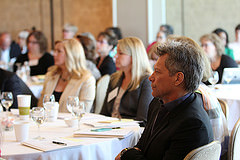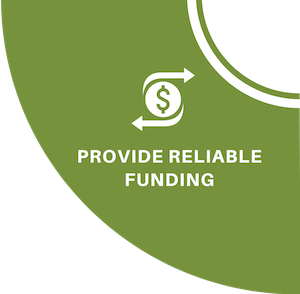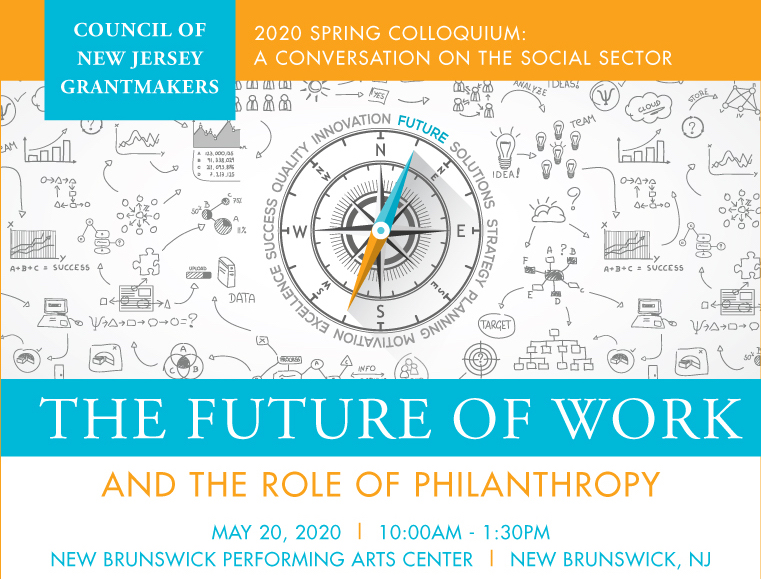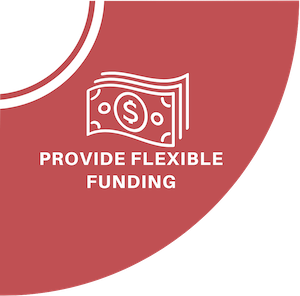Site Search
- resource provided by the Forum Network Knowledgebase.
Search Tip: Search with " " to find exact matches.
Multi-year Grants
Affirmation: Multi-year funds provided both reliability and breathing room for nonprofits.
Making fundamental and long-lasting change comes with the promise of reliable investments. Longer grant terms create an environment where collaborative partnerships can flourish, and trust and transparency break down power dynamics. The result is that nonprofits have the “breathing room” and financial stability to focus activities where they are most needed.
Although many funders award grants to the same nonprofits year after year, they often require submission of annual applications that request information they already have and are complex and needlessly lengthy. These processes can heighten mutual distrust. From a practical standpoint, multi-year awards reduce paperwork for both funder and nonprofit and open communication channels promoting shared goals, mutual trust, and increased overall impact.
Activities
• For funders that historically award repeat annual grants to the same nonprofit partners, shift from an annual grant/proposal cycle to a long-term, multi-year commitment with an annual outcomes/progress report in lieu of a full application.
• Tailor grant terms to suit grantee timelines and needs (negotiated outcomes and milestones).
• If data collection is required solely to meet a funder’s compliance requirements, the funder should assume this responsibility or provide sufficient funding and/or capacity for the nonprofit to meet the requirement.
Short-term Outcomes
• The number of funders making multi-year grants increases by 50% over the previous years.
Long-term Outcomes
• More funders convert an annual application process for repeat grantee partners to a multi-year commitment with an annual outcomes report at the most, instead of full proposals each year.
• Funders assume responsibility for data collection or provide sufficient funding and/or capacity for the nonprofit to meet the requirement.
• Grant terms are suited to grantee timelines and needs (negotiated outcomes and milestones).
How to Begin Doing Good Better on Reliability
Learning opportunities
• What barriers keep funders from making long-term commitments to repeat grantee partners? Are any of these barriers legal?
• What are the minimum data requirements for funders to collect from repeat grantee partners?
Pre-Work
• Address the barriers to awarding multi-year grants through tested tools.
• Learn about how multi-year grants strengthen grantee partners and improve philanthropic, nonprofit, and community impact.
• Research mechanisms funders can use to meet legal compliance requirements while gaining trust in their grantee partners.
Responding Post Sandy: Philanthropic Relief & Recovery
Superstorm Sandy officially came ashore in New Jersey on October 29, 2012 at 8:00 p.m. and its aftermath continues to be felt in communities throughout our state. Not 24 hours after the storm made landfall, CNJG began planning a series of actions to help inform funders what to be prepared for, share information and discuss strategies. CNJG's support of the philanthropic community as it navigates the shifting landscape of disaster recovery, continues.
CNJG has been working closely with their philanthropic members in New Jersey and their philanthropic colleagues from around the nation who have experience in disaster philanthropy, as well as working cooperatively with the Governor’s Office on Recovery, FEMA, NJ State Police Office of Emergency Management, NJ Voluntary Organizations Active in Disaster, NJ’s Long Term Recovery Group Leaders, and NJ’s leading nonprofit organizations.
Post Sandy Funder Briefings
Beginning one week after Sandy struck New Jersey CNJG launched a weekly conference call series for grantmakers to hear from policymakers, disaster relief/recovery experts and colleagues who have been through similar catastrophes. Grantmakers heard from nearly 70 guest speakers including policymakers, disaster relief and recovery experts, and statewide and national foundation leaders that have experienced similar catastrophes. The briefings provided an opportunity to connect directly with local leaders and state officials addressing the many needs of our communities. Grantmakers learned about issues related to both disasters in general and Sandy recovery in particular. Topics included housing, mental health, social justice, universal design, FEMA’s National Disaster Recovery Framework, and an array of environmental issues. All of the calls were recorded and also transcribed into concise written summaries and are available on our website.
Series 1 ran from November 2012 -- March 2013
Series 1 Audio Recordings
Series 1 Written Summaries
Series 2 ran from September 2013 -- November 2013
Series 2 Audio Recordings
Series 2 Written Summaries
Series 1 & 2 Written Compendium
Funders’ Briefing Post Sandy Recovery at 18 months
 With support from the Jon Bon Jovi Soul Foundation and OceanFirst Foundation, CNJG presented a specific briefing on housing, hunger and mental health recovery efforts and needs 18 months after the storm. We heard personal stories from families that were displaced and their long struggle to rebuild and recoup. We heard insights from service providers on the long term effects of Sandy. Several Long Term Recovery Groups described some of their ongoing challenges, but also shared what was working.
With support from the Jon Bon Jovi Soul Foundation and OceanFirst Foundation, CNJG presented a specific briefing on housing, hunger and mental health recovery efforts and needs 18 months after the storm. We heard personal stories from families that were displaced and their long struggle to rebuild and recoup. We heard insights from service providers on the long term effects of Sandy. Several Long Term Recovery Groups described some of their ongoing challenges, but also shared what was working.
CNJG’s response to Superstorm Sandy also included
Coastal Communities Site Visit Tours
CNJG offered its members a rare opportunity to tour several of the disaster-affected communities in Monmouth and Ocean Counties and to hear from those on-the-ground. Throughout the day, twelve guest speakers representing all areas of the effort, including individuals from FEMA, local and state government, Long Term Recovery Group leaders, city and state planners, environmental professionals, social services personnel, and faith-based leaders, among others spoke to a group of 60 philanthropic leaders. Building upon the first successful Coastal Communities Site Visit Tour, CNJG offered a similar program focusing on communities in northern New Jersey – specifically the hard hit areas in Essex, Hudson and Bergen Counties. In addition to hearing from a wide range of local officials, Long Term Recovery Group Leaders, urban planners, and environmental experts, the site visit included a tour of a PSEG sub-power station which was flooded.
Statewide Conference
Bringing together an incredible community of funders, providers and practitioners for a day of exploration, shared learning and discussion at the Spring 2013 Conference for the Social Sector - Our Shared Road Ahead: Sandy and Beyond on June 10. The Conference provided participants with an important opportunity to hear about the lessons learned by social sector colleagues and experts around the country who have grappled with how to create effective long-term philanthropic responses to catastrophic events in the absence of a readily available guide.
Superstorm Sandy Philanthropic Investments Scan
Philanthropy & Hurricane Sandy: A Report on the Foundation & Corporate Response is a report released in October 2014 by CNJG and partners that examines the response of foundations, corporations, and other institutional donors to the devastation wrought by Hurricane Sandy in October 2012. Numbering nearly 600, these funders have so far committed more than $380 million for relief, recovery and building efforts. The hard data and reflective observations in the report contribute to the growing body of knowledge that helps foundations and corporations be strategic and effective with their giving when disaster strikes.
Two years after the historic storm, this report breaks down the allocation of dollars contributed thus far and offers perspective on the role of private giving in disaster response and lessons to be taken from this one. The report was published by the Foundation Center in partnership with the Council of New Jersey Grantmakers and Philanthropy New York, and with support from the Center for Disaster Philanthropy.
Special thanks to our philanthropic partners that have supported various aspects of the Council’s work beginning immediately after Hurricane Sandy struck through our ongoing work today, including: the Center for Disaster Philanthropy, Citi, Fund for New Jersey, The Henry & Marilyn Taub Foundation, The Horizon Foundation for New Jersey, Hurricane Sandy New Jersey Relief Fund, JCP&L, JPMorgan Chase, Jon Bon Jovi Soul Foundation, The Merck Company Foundation/Merck & Company, Inc., PSEG Foundation, Provident Bank Foundation, Rita Allen Foundation, Subaru, TD Bank, United Way of Essex and West Hudson, Verizon NJ, and the Victoria Foundation.
A sample document detailing the core values of the Betty and Davis Fitzgerald Foundation including restrictions on participation on nonprofit/grantee boards.
As a follow-up to our Giving in Indiana study (released earlier this year), Indiana Philanthropy Alliance is pleased to share this snapshot of promising practices for advancing diversity, equity and inclusion in Indiana philanthropy. Throughout our state, foundations are incorporating the values of diversity, equity and inclusion (DEI) into their organizational cultures; engaging diverse populations as staff, board members, donors, and grantees; and working to make their communities more welcoming places. This report is an effort to capture a sampling of these endeavors.
To answer the basic question of how many active family foundations are planning to spend down or exist in perpetuity (or have not yet made a decision), and to examine foundations’ motivations and decision-making, the Foundation Center, in collaboration with the Council on Foundations and with additional assistance from the Association of Small Foundations, launched a study of family foundations in 2008. This report presents the full range of study findings, which are based on survey responses from 1,074 family foundations.
CNJG's 2018 Annual Meeting & Holiday Luncheon pre-meeting workshop with Michelle Greanias from PEAK Grantmaking focused on how foundation CEO’s, program officers, staff, and trustees could engage internally to put values-based grantmaking into practice.
Walk the Talk Video
The Future of Work and the Role of Philanthropy
Date: This event has been postponed.
After much consideration and in light of the ongoing spread of coronavirus, CNJG has decided to postpone the 2020 Spring Colloquium, entitled The Future of Work and Philanthropy’s Role.
This was a difficult decision, but the health and safety of attendees and staff are of the utmost importance at this time. It is especially significant because our communities--and indeed our state--rely so heavily on the services and programs made possible by New Jersey’s foundations and charitable organizations. We do not want to do anything that could impede the good work being done by our philanthropic and nonprofit staff, leaders and stakeholders.
We are tremendously grateful to PSEG, our Signature Sponsor, for their continued support, and thank the CNJG Program Committee for their thoughtful guidance and ongoing assistance.
General Operating Support or General Project Support
Affirmation: Funds with the least restrictions are the most valuable
Nonprofits maintain and strengthen their organizations when their funds are unrestricted. Data shows flexible and reliable funding increases impact when nonprofit leaders have control over how funds flow to meet the needs of their constituents and internal operations, as demonstrated during the pandemic when funders released previously restricted funding. General operating support (GOS) funding signals trust in our partners and can open more honest dialogue about meeting the mutual goals of the funder and nonprofit. Funders who make project or program grants should trust the organization and provide flexible funding within a specific program.
Activities
• Over the short term, funders aim to shift their GOS activity by 30%. (30% more grants shift from program to GOS, or from fully restricted to negotiated GOS.)
• Provide grants as unrestricted organizational general operating support. The long-term ideal is for most, if not all, grants to be 100% GOS, unless a funder is legally precluded from doing otherwise.
• For project/program grants, 100% of the grant awarded is unrestricted (negotiated GOS), applying mission-based and mutually negotiated outcomes.
• Nonprofits articulate their organizational vision, strategies and intended outcomes to funders; funders understand the models of their grantee partners and learn from them how the grantee partner's work will lead to change.
• Trust nonprofit partners to know how to best apply their funding.
• Create a shared understanding of the meaning and importance of full-cost budgeting and real-cost funding.
Short-term Outcomes
• 70% of funders are shifting some of their distribution to making general operating support grants.
• 100% of program/project grants are designated unrestricted.
Long-term Outcomes
• 100% of all grants are made without restrictions, unless limited by covenant or donor wishes in the case of community foundations.
• All nonprofits can clearly articulate their vision, strategies, outcomes, and business models to funders; and funders understand them and trust them to know how best to use their funds.
How to Begin Doing Good Better on Flexibility Learning Opportunities
• Why aren’t some funders planning to award GOS or negotiate GOS?
• Ask funders: If you participated in CNJG’s 2022 funder survey and indicated that you planned to initiate GOS, have you done so? • Why are some grants restricted?
• What would it take for funders to change?
Pre-Work
• Seek and share learning opportunities for funders, prioritizing education of foundation boards, to address the barriers to awarding GOS and understand how restricted funding undermines financial sustainability.
• For funders who already regularly provide GOS funding, educate/advocate for others to do the same.
• Learn how GOS/negotiated GOS strengthens grantee partners and the multiple ways they can use and evaluate GOS. Actively seek insights from nonprofits to reinforce the message about GOS in their funding partnerships.
• As an incremental step for funders that are not receptive to GOS, provide education about negotiated general programming support (flexible funding within a mutually agreed-upon program area, as opposed to organization-wide GOS).
• Share promising practices on evaluation of GOS and negotiated GO



